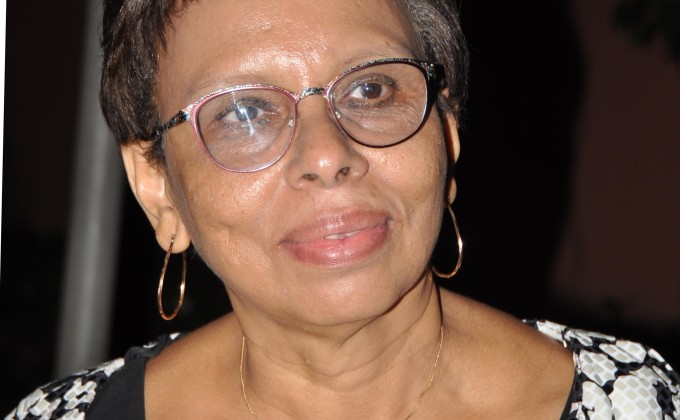
Clémence SANOU ARISTE, an expert in education, got her start as a teacher before becoming fully involved in the management of projects related to girls' schooling. Since 2019, she has been the field director of the Project in Support of Institutional and Technical Reforms for Equity (PARITÉ*).
Clémence Sanou Ariste was born into a family of eleven children with open hearts and minds. Her mother, a health care worker and later a midwife, was known and recognized for her help in delivering life. "She was a fighter. I can say that she inspired me to become an independent person”. She was lucky to have a father in the medical field who made the education of all his children one of his top priorities. He had faith in his daughters.
My father insisted that we do the best studies, until the university. To those who said: those who don't have a son, the name will be lost. He answered: Give a good education to your daughters, it is your name that will be carried everywhere.
In keeping with family tradition, while she was in high school, Clémence Sanou Ariste volunteered to teach evening classes to unschooled adults. After obtaining her master's degree, she became a teacher in a private school. Then, thanks to the Canadian Francophonie Scholarship Program, she obtained a doctorate in education at the Université de Montréal, specializing in adult education.
She then decided to work within the NGO community and coordinated projects dedicated to improving girls' access to and retention in school. She has worked for several organizations in education programs including Catholic Relief Services (CRS), the Burkinabe Response to Improve Girls’ Chances to Succeed (BRIGHT) project, and the Valorisation de la Scolarisation VAS Y FILLE! project with Save the Children International (SCI) in the Democratic Republic of the Congo. She also worked for two years in Mali with the Education Development Center.
This year, in Burkina Faso, the national theme for March 8 is titled “Security and health challenges, strategies for better protection of women”.
For that matter, for Clémence Sanou Ariste, insecurity is a major challenge that the education system has faced since 2015. As of January 31, 2022, according to figures from the Ministry of Education, 3,405 schools are closed, or just over 13% of the educational infrastructure, due to armed attacks. Social services institutions, educational facilities, and health centres are under attack. There is an estimated 1,500,000 internally displaced persons at present. "This has a strong impact on education because the displaced persons' camps add to the overcrowding and the drop-out rate, especially for girls. This opens the door to all sorts of vices, to prostitution and to gender-based violence”.
Burkina Faso, like other countries, under the impetus of technical and financial partners, has implemented ten-year plans for the development of basic education since 1995. Today, the gross enrollment rate is slightly over 92% and in some regions girls outnumber boys, proving the positive results of strategies to improve access and retention of girls in school since 1999-2000. But major educational issues persist, and PARITÉ is trying to address them. The role of Clémence Sanou Ariste is to coordinate all the activities of the technical team and the management of the project in Burkina Faso.
"We are seeing deterioration in the quality of education. Young people finish their post primary education but struggle to understand the short texts that they read. Among other factors, overcrowding, the lack or inadequacy of teaching materials, and the low level of the teachers themselves are responsible for the deterioration of the quality of learning. There are major challenges in terms of quality and access to education as well as regional disparities”.
The ultimate goal of the project is to improve the quality of education. The intermediate outcome is to improve the professional practices of the Ministry of National Education and Promotion of National Languages (MENAPLN).
We have a section related to the management of education finances to make it more inclusive and transparent. We are working to strengthen the capacities of the Ministry, to reduce gender-related disparities in terms of access, to support the improvement of learning, particularly for girls, by taking into account the notion of gender equity in primary education. Finally, it is a matter of ensuring efficient and sound management of education finances and in the procurement of contracts at both the central and decentralized levels
During year two of PARITÉ, the capacities of management staff were reinforced, and gender equity was better integrated in senior management. Clémence Sanou Ariste also notes that there are few women in management or leadership positions within the Ministry. While there are many women teachers, there are few women principals or pedagogical supervisors. An employment equity study on the advancement of women into leadership positions within the Department of Education has been commissioned.
Clémence Sanou Ariste advocates giving more power to the directorate for the promotion of girls' education, which works on the strategic aspects of improving access, retention, and enrollment of girls in school, which is often overlooked in other sectors. "For example, when it is time to develop learning or teaching materials, this directorate is not sufficiently solicited in time during the processes, yet it must provide support so that gender aspects are taken into account at all levels and in all sectors of the educational system".
Clémence has never stopped working to provide access to inclusive quality education for all, especially girls, in her country.
My mission takes on its full meaning today as a way of protecting women's rights in the face of attacks by armed terrorist groups against educational structures